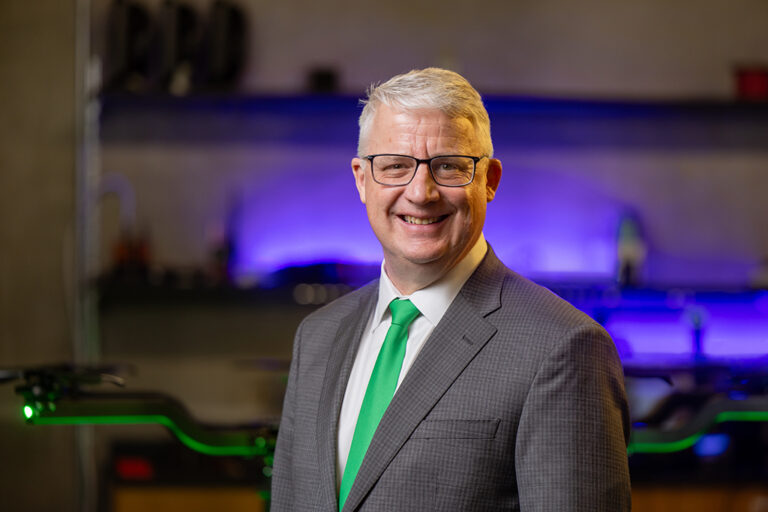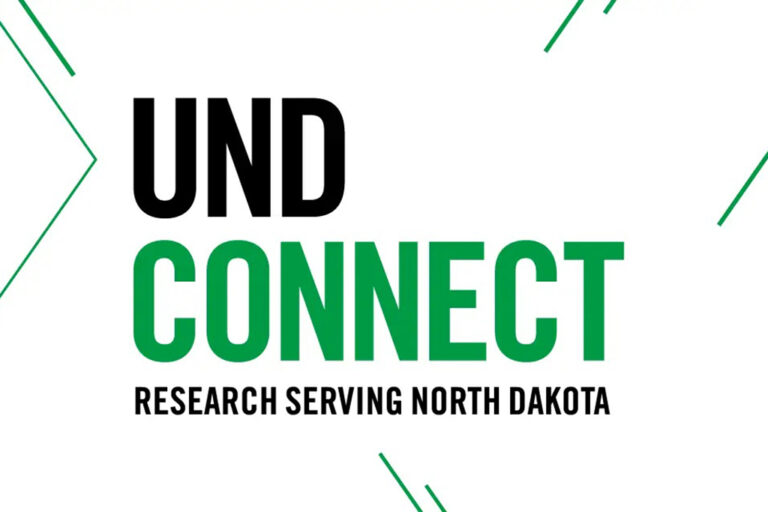‘Scholarly Commons’ yields world of possibilities
New online repository expands UND’s ability to share research and scholarship globally

Zeineb Yousif gets fired up about the reach of UND research.
As the UND Digital Initiatives Librarian showed off an online map displaying where UND articles, art and archives are accessed around the world, her eyes widened with delight.
“Oh, Hawaii!” she exclaimed, clicking on the 50th state. “It looks like they downloaded the ‘History of North Dakota’ and some Geology theses. That’s awesome!”
The platform of Yousif’s excitement is the UND Scholarly Commons, an online institutional repository that she’s developed over the past year with Stephanie Walker, UND Dean of Libraries & Informational Resources. The Scholarly Commons, which launched in late September, has the ability to house any research or creative activity undertaken at UND.
“It’s an opportunity to preserve and disseminate your research more broadly,” Yousif explained. “It’s our way of drawing attention to the work and making sure that it’s accessible to the public.”
The flexible repository can hold a range of materials – articles, theses, datasets, image collections, audio, video, open educational resources (OERs) and much more. For example, UND Art Collections is using the Commons as a display and inventory tool.
Walker has been working toward the establishment of an institutional repository since she arrived at UND in 2015. She said most major granting agencies will only give out funding if the supporting material and outcomes are made publicly available.
“I wanted to make it easier for faculty to get the grants and for them to be able to put their research data in a specific place,” Walker said, adding that most U.S. universities UND’s size and larger have an institutional repository in place. “It’s pretty much critical for research.”
Supporting researchers

The Scholarly Commons is launching hand-in-hand with a renewed drive to increase UND’s understanding of scholarly communication and publishing, an initiative led by Social Sciences & Scholarly Communication Librarian Sara Kuhn and Education Reference Instruction and Collection Development Librarian Megan Carroll-Denis, and Business and Government Documents Librarian Holly Gabriel.
Kuhn and Gabriel are working with David Flynn, chair of Economics and faculty fellow for the Division of Research, to help faculty track and demonstrate their research impact and productivity. Accurate research tracking is a vital action item of One UND Strategic Plan Goal No. 4 – enhancing discovery at a level consistent with most research-intensive universities.
A part of that work is crafting online guides that lead users through open access publishing, OERs, data management, research communities, author’s rights and publishing strategies.
“We are experts in using those tools, so we’re happy to share what we know,” Kuhn said. “That’s what we’re here for, and to continue a conversation about how faculty can use these guides to meet their research needs and show their research impact for promotion and tenure.”
Expanding reach
The Scholarly Commons will allow UND’s academic dialogue to cross continents. Yousif explained that extended reach is the repository’s biggest bonus.
“There’s a huge disparity in the citation count you get for something openly available online versus something you’ve only done in traditional publishing. People will cite you more,” she said, continuing to describe the benefit of the tool’s robust search optimization. “Our content is showing up on Google. I’m seeing downloads everywhere: up to 23 different countries in just two months.”
And more eyes on one’s work means more potential for making a breakthrough connection.
“You’re not just talking to the researcher in the cubicle or office next to you,” Kuhn added. “You’re reaching a broader audience, and some of the people in this audience might not be affiliated with institutions – they might be affiliated with private companies or corporations – but be very interested in partnership or collaborating in research.”
Some are already finding ways to use the Scholarly Commons for cross-institutional work. Walker said one researcher at the UND Energy & Environmental Research Center plans to collaborate with multiple universities using the repository as a home base for data storage and communication. The team will simply set up a private area in the Scholarly Commons and work on their project online.
“When they’re ready to unleash it, they just change the privacy settings and make it open,” Walker grinned.
Spread the word
Now that the Commons is up and running, Walker and her team want the campus to fill it.
They’ll meet with faculty to explain how the repository – paired with advanced scholarly communication techniques – can help push research tracking and dissemination to the next level, and how students can harness the system for making Capstone projects or graduate-level theses open access for building their portfolios.
“We want to put out a call for faculty champions – anyone who really understands the benefits and wants to help sow the seed of promotion within their departments,” Kuhn said. “Sometimes it’s on-the-ground, guerilla marketing that gets it done.”
A formal Scholarly Commons launch event in January will coincide with the unveiling of the Chester Fritz Library’s new interactive display unit called the MagicBox. The 3-D adaptable case, purchased through the generosity of the Myers Foundation, will be used initially to display Elwyn B. Robinson’s “The History of North Dakota” (now housed as an OER on the Scholarly Commons), but exhibits can be reprogrammed at any time.
UND’s librarians are in the business of enhancing discovery. Now, they’re equipped to help share those discoveries with every corner of the map.
“It’s really great to be able to work on something that makes it so the research that we do here is available all around the world and we can continue the scholarly conversation,” Yousif beamed.


